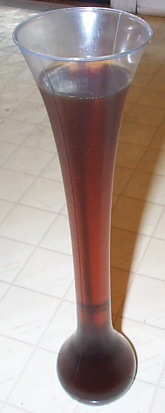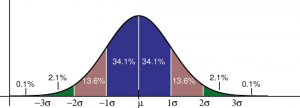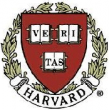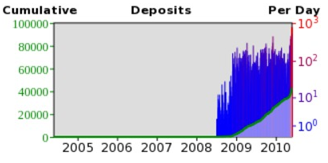Tuesday, June 22. 2010
Important Update Update (July 15 2013)
More Fell Fallout From Finch Folly: The Royal Society Relapse
  [updated 27/6/10]
The Royal Society is fully green again, endorsing unembargoed OA self-archiving of the author's final draft, immediately upon acceptance for publication, thereby reinstating the world's most venerable publisher on the side of the angels, where it belonged all along, historically.
With much gratitude from the research community and posterity!
In its OA FAQ, the Royal Society OA misdefines Green OA as follows: "Green open access: Authors may deposit a pre-print of their article in a repository at any time and they may deposit the final, accepted manuscript version of their article in a repository from 12 months after publication." Whereas one can be agnostic about the hybrid gold OA option that the RS and many publishers are offering (including the promise of transparency in translating hybrid Gold OA uptake increases into subscription price reductions), this takes on an entirely different complexion if the publisher is not Green (as, for example, CUP, APS, IOP, AAAS, Springer and Elsevier all are, whereas OUP and NPG, and now possibly the RS, are not).
For if the publisher imposes a 1-year embargo, that is tantamount to a constraint -- on any author that needs and wants immediate OA -- to pay for the hybrid Gold OA option instead of just providing Green OA.See also: Not a Proud Day in the Annals of the Royal Society (2005)
Thursday, June 17. 2010
 The University of California (UC) dispute with Nature Publishing Group (NPG) is about journal pricing -- an important topic, but one on which I have no expertise, hence take no position. It needs to be pointed out, however, that there are two points in UC's latest response to NPG's response that are incorrect:
(1) It is incorrect that "NPG has been a leader in adopting the 'green' publishing policies."
A green publishing policy on open access (OA) means explicitly endorsing authors providing OA to the peer-reviewed final drafts of their papers ("postprints") immediately upon acceptance for publication (as 63% of journals do, including the counterpart of NPG's Nature, AAAS's Science). NPG was once, in 2003, a leader in green OA, but it backslid in January 2005 to declaring that its authors should wait six months after publication before making their postprints OA.
(2) It is incorrect that "UC... libraries... pay... fees to get access to their own work."
UC libraries (like all other libraries) pay fees to access the work of other universities. If UC is concerned about providing access to its own work, it should mandate Green OA. When other universities do likewise, UC will gain access to their work too (though for the first six months, that access to Nature articles in particular may have to be " Almost OA" rather than OA, owing to Nature's regressive embargo...)
Stevan Harnad
American Scientist Open Access Forum
Wednesday, June 16. 2010
 Chen & Konstan's (C & K) paper, " Conference Paper Selectivity and Impact" is interesting, though somewhat limited because it is based only on computer science and has fuller data on conference papers than on journal papers.
The finding is that papers from highly selective conferences are cited as much as (or even more than) papers from certain journals. (Journals of course also differ among themselves in quality and acceptance rates.)
Comparing the ceiling for citation counts for high- and low-selectivity conferences by analyzing only the equated top slice of the low-selectivity conferences, C & K found that that the high-selectivity conferences still did better, suggesting that the difference was not just selectivity (i.e., filtration) but also "reputation." (The effect broke down a bit in comparing the very highest and next-to-highest selectivity conferences, with the next-to-highest doing slightly better than the very highest; plenty of post hoc speculations were ready to account for this effect too: excess narrowness, distaste for competition, etc. at the very highest level, but not the next-highest…)
Some of this smacks of over-interpretation of sparse data, but I'd like to point out two rather more general considerations that seem to have been overlooked or under-rated:
( 1) Conference selectivity is not the same as journal selectivity: A conference accepts the top fraction of its submissions (whatever it sets the cut-off point to be), with no rounds of revision, resubmission and re-refereeing (or at most one cursory final round, when the conference is hardly in the position to change most of its decisions, since the conference looms and the program cannot be made much more sparse than planned). This is passive filtration. Journals do not work this way; they have periodic issues, which they must fill, but they can have a longstanding backlog of papers undergoing revision that are not published until and unless they have succeeded in meeting the referee reports' and editor's requirements. The result is that the accepted journal papers have been systematically improved ("dynamic filtration") through peer review (sometimes several rounds), whereas the conference papers have simply been statically ranked much as they were submitted. This is peer ranking, not peer review.
(2) "Reputation" really just means track record: How useful have papers in this venue been in the past? Reputation clearly depends on the reliability and validity of the selective process. But reliability and validity depend on more than the volume and cut-off point of raw submission rankings (passive filtration).
 I normally only comment on open-access-related matters, so let me close by pointing out a connection:
There are three kinds of selectivity: journal selectivity, author selectivity and user selectivity. Journals (and conferences) select which papers to accept for publication; authors select which papers to submit, and which publication venue to submit them to; and users select which papers to read, use and cite. Hence citations are an outcome of a complex interaction of all three factors. The relevant entity for the user, however, is the paper, not the venue. Yes, the journal's reputation will play a role in the user's decision about whether to read a paper, just as the author's reputation will; and of course so will the title and topic. But the main determinant is the paper itself. And in order to read, use and cite a paper, you have to be able to access it. Accessibility trumps all the other factors: it is not a sufficient condition for citation, but it is certainly a necessary one.
Stevan Harnad
American Scientist Open Access Forum
Saturday, June 12. 2010
 Oxford University Press Journals has issued a highly misleading press release -- " Open Access Uptake: Five Years On," not making it clear that it is not Open Access (OA) uptake that is declining, but merely the uptake of OUP's pricey "Oxford Open (OO)" paid hybrid-Gold OA option.
OUP offers its authors the option of paying (a sizeable sum) to have an article that has been published in OUP's subscription journals made OA (freely accessible online). Each OUP journal continues to collect subscription income, and the rest of its articles continue to be non-OA, but the paid-up OO articles are made OA by OUP -- along with a promise to lower OUP journal subscription costs proportionately, as hybrid Gold uptake increases. So this OUP press release is really just telling us that the uptake for the OO option is not increasing, but decreasing.
What is stated, however, is that it is OA uptake itself that is decreasing, which is the very opposite of the truth.
Globally, across all journals, "Green OA" self-archiving, by authors, of their own articles in OA repositories -- already 2-3 times the uptake of OUP's paid hybrid Gold OA option -- is increasing, not decreasing, in no small part because Green OA self-archiving mandates by authors' institutions and funders, requiring them to deposit their articles in OA repositories, are increasing.
The existence of the Green OA option is also the obvious explanation of why OUP's OO hybrid Gold uptake is low: Why should authors pay for Gold OA when they can provide Green OA for free (especially while subscriptions are still paying the costs of publication -- as well as tying up the potential funds to pay for Gold OA)?
But OUP does not mention Green OA. Nor does it mention that OUP is among the minority of major publishers that have not yet given their green light to their authors to provide Green OA immediately upon acceptance for publication, instead attempting to impose an embargo of 12 to 24 months on Green OA (perhaps in the hope of forcing their authors to resort to paying for the OO option instead).
OUP is definitely not giving a good account of itself as the history of OA is writing itself today. Cambridge University Press (CUP), for example, among university publishers, The American Physical Society (APS) and the American Association for the Advancement of Science (Science magazine), among learned-society publishers, and even Elsevier and Springer, among commercial publishers are among the majority that are behaving far more responsibly and progressively than OUP, being on the " side of the angels" insofar as endorsing the immediate Green OA option for their authors is concerned.
Stevan Harnad
American Scientist Open Access Forum
Thursday, June 10. 2010
  Stuart Shieber's recommendations in his "A proposal to simplify the University of North Texas open-access policy" are very good and their spirit should be followed, because that would indeed simplify and clarify the UNT policy, currently somewhat longer and more complicated than it needs to be.
But there is an even simpler way to put it (though it does involve three components, not just two): (1) Immediate deposit required. (2) Immediate OA strongly recommended, but not required. (3) Rights retention and license strongly recommended, but not required. That's all.
Stuart's recommendations for simplifying the rights reservation and licensing details are well taken; and they do make the policy as a whole more consistent and coherent. But (1) and (3) alone, leaving out (2), would not make it clear enough to authors what the real contingencies are, even though Stuart is quite right that, by implication, (2) is in a sense implicit in (3). Waiving (3), however, does not entail waiving (2), any more than waiving (2) or (3) implies waiving (1).
There is no "Harvard-style" vs "Harnad-style" approach. That initial difference vanished completely as soon as the Harvard mandate was upgraded to add an immediate-deposit requirement, without waiver, to its original license requirement, with waiver.
The rest is just about clarifying the contingencies. (1) Yes, you have to deposit immediately, no matter what. (2) No, you don't have to make the deposit OA immediately, if you have reason not to; it is just strongly recommended. (3) No, you don't have to reserve the specified rights and grant the license if you have reason not to, it is just strongly recommended.
I think the current Harvard version still does not make the three contingencies sufficiently clear and explicit (although they are latent in the Harvard FAQ), whereas the UNT version does. Streamlined along the lines Stuart suggests, UNT will do so even better.
 Ceterum censeo Ceterum censeo, I am confident that the extra rights that Harvard seeks in (3) (basically amounting to " Libre OA") will eventually come with the IDOA territory, following as a natural matter of course, with time, once the IDOA version of the OA mandate becomes widely adopted. IDOA guarantees only about 63% immediate Gratis OA plus 37% " Almost-OA" today. But once it is universally adopted, the rest of the dominoes will fall, leading first to 100% Gratis OA, and then to as much Libre OA as authors and institutions want and need. The trick is to come up with a policy model, today, that is strong enough to do the trick -- not so strong as to impede or retard universal adoption, but strong enough to ensure compliance: I think the UNT version (with Stuart's recommended tightening) will prove to be that optimal model.
See: " Which Green OA Mandate Is Optimal?"
Stevan Harnad
American Scientist Open Access Forum
Wednesday, June 2. 2010
 The Congress of the Humanities and Social Sciences at Concordia University in Montreal on Monday May 31 featured a symposium on The Age of Open Access: New paradigm for universities and researchers. To see the web-stream of the session, click here.
John Willinsky ( Stanford University) and Heather Joseph ( Scholarly Publishing and Academic Resources Coalition, Washington) reported on the progress and promise of OA; Michael Geist ( University of Ottawa) discussed the more general question of copyright in the digital age, and Gerald Beasley ( Concordia University) reported on the very productive faculty consultations that led up to the adoption in April of the Concordia mandate, Canada's first university-wide Green Open Access mandate (motivated in part to coincide with this very Congress, and strongly encouraged by the Congress's Academic Convenor, Ronald Rudin, Professor of History at Concordia).
Most of the subsequent discussion from the audience focused on the funding of Gold OA publishing rather than on the mandating of Green OA self-archiving that has been spearheaded among US universities by Harvard's Robert Darnton (who also spoke at Congress) and Stuart Shieber and among Canadian universities by Concordia's Ronald Rudin and Gerald Beasley. Yet it is Green OA Mandates that will usher in "The Age of Open Access" -- which, all the presenters agreed, has not yet arrived!.
On Wednesday, June 2, there are two further OA events at Congress:
"Open Access: Transforming research in the developing world"
Access to knowledge is fundamental to all aspects of human development, from health to food security, and from education to social capacity building. Yet access to academic publications is severely restricted for many developing countries. As well, the prohibitive cost of publishing and distributing journals in the developing world means much of the research done there remains ‘invisible’ to the rest of the world. This panel will bring together experts to explore the potential impact of Open Access on the developing world.
Moderated by Haroon Akram-Lodhi (Trent University), this panel will bring together Buhle Mbambo-Thata (UNISA Library, South Africa), Leslie Chan (University of Toronto) and Hebe Vessuri, (Venezuelan Institute of Scientific Research). It will be followed by a celebration of Concordia University’s commitment to Open Access at the Libraries, 5pm - 7pm, at the Webster Library (LB Building 2nd Floor)
Tuesday, June 1. 2010
  U Liege's Rector, Bernard Rentier, reports that over the past year deposits to the U. Liege repository ( ORBi) have grown from 10 to 40 thousand publications, 25 thousand of them full-text. According to ROAR, this is the 3rd highest growth rate among the world's thousand identified institutional repositories. Viewed 650 thousand times and downloaded 61 thousand times, these 40 thousand deposits coincide with the first year in which, as a part of U Liege's Open Access Mandate, ORBi has served as U Liege's sole official means of submitting publications for performance review for academic promotion.
  Professor Robert Darnton of Harvard University has given a splendid (if a trifle US-centric, indeed Harvard-centric!) talk at the Congress of the Humanities and Social Sciences at Concordia University.
Caveat 1: Journal Articles Versus Books. Professor Darnton's three jeremiads (one on journal articles, two on books) are all spot-on -- but best kept separate, partly because only journal articles are, strictly speaking, Open Access (OA) issues, but mostly because the journal article access problem already has a straightforward solution -- and Harvard was the first university in the US (though only the 16th worldwide!) to adopt it: Mandating "Green" OA self-archiving of all journal articles published by its authors.
In contrast, book OA cannot be mandated, for the simple reason that all journal article authors already wish to give away their articles free for all users online, rather than leaving them accessible only to users at universities that can afford to subscribe to the journal in which they were published; this is far from being true of the authors of all or even most books. Hence trying to treat or even conceptualize journal article access and book access as the same problem would handicap the journal article access problem -- which already has a simple, immediate, and complete solution (OA mandates) -- with the complications of the book access problem, which does not.
Caveat 2: The "Give-Away/Buy-Back" Argument. Nor does it diminish the importance and effectiveness of the mandate solution to the journal article access problem which Harvard has so successfully championed that one of the arguments many (including Professor Darnton) have invoked in its favour happens to be specious. The need and wish on the part of the authors of refereed journal articles (for the sake of both research progress and the progress of their own careers) to make them accessible to all would-be users -- rather then leaving them accessible only to those users whose institutions can afford to subscribe -- is already decisive. There is no need to add to it the " we give it to publishers for free and then we have to buy it back" argument, because it's just not valid:
When a university subscribes to a journal, it does not do so in order to buy back its own published research articles: It does so in order to buy in the research articles published by other universities! In that respect, the transaction is the same as it is with books -- except that book authors may be seeking royalties whereas journal articles are not.
So this specious argument -- though it does well express the frustrations of university libraries because of the way their swelling annual serials budgets keep cannibalizing their book budgets -- is not needed in order to make the case for mandating journal article OA: The fact that mandating journal article OA is feasible and effective, that it maximizes article usage and impact, and that it is beneficial and desirable to all journal article authors is already argument enough, and decisive.
Caveat 3: Funding Gold OA Without Mandating Green OA. Similarly unnecessary is continued worry about university journal budgets -- once universities universally follow Harvard's example and mandate Green OA self-archiving. For once all journal articles are freely accessible online, whether and when to cancel unaffordable journals is no longer the agonizing problem it is now: The inelastic need is satisfied by the Green OA version, hence the subscription demand (and the resultant cannibalization of book budgets by journal budgets) is no longer inelastic.
In addition to its Green OA self-archiving mandate, Harvard has also launched the Compact for Open-Access Publishing Equity ( COPE), a commitment to provide some money to pay the costs of Harvard authors who wish to publish in "Gold" OA journals (journals that make their articles OA). The purpose of funding COPE is to encourage publishers to make a transition to Gold Open Access publishing. This is commendable, but it needs to be noted that it is not really urgent or necessary at this time, when journal publication is still being abundantly funded by universities' annual subscriptions -- which cannot be cancelled until and unless Green OA first prevails!
So committing spare funds that Harvard may have available to pay for Gold OA for some of Harvard's article output is of course welcome, given that Harvard has already mandated Green OA for all of its article output. But alas COPE has now inspired membership by other universities that are emulating Harvard only in committing funds to pay for Gold OA, not in mandating Green OA, thinking that they are thereby doing their bit for OA! The Harvard model would be much more useful for the universities worldwide that are keen to emulate it if it were made clear that COPE should only be committed as a supplement for a Green OA mandate, not as a substitute for it. (See some of my own jeremiads on this matter.)
Fortunately, Concordia University, the host for this Congress, has adopted a Green OA mandate before even thinking about whether or not it has any extra cash to commit to COPE!
(If and when universal Green OA frees universities to cancel journals, it will by the same token free that windfall cancellation cash to pay for Gold OA.)
Stevan Harnad
American Scientist Open Access Forum
|

 Chen & Konstan's (C & K) paper, "
Chen & Konstan's (C & K) paper, " I normally only comment on open-access-related matters, so let me close by pointing out a connection:
I normally only comment on open-access-related matters, so let me close by pointing out a connection:
 Stuart Shieber's recommendations in his
Stuart Shieber's recommendations in his 
 The
The 




